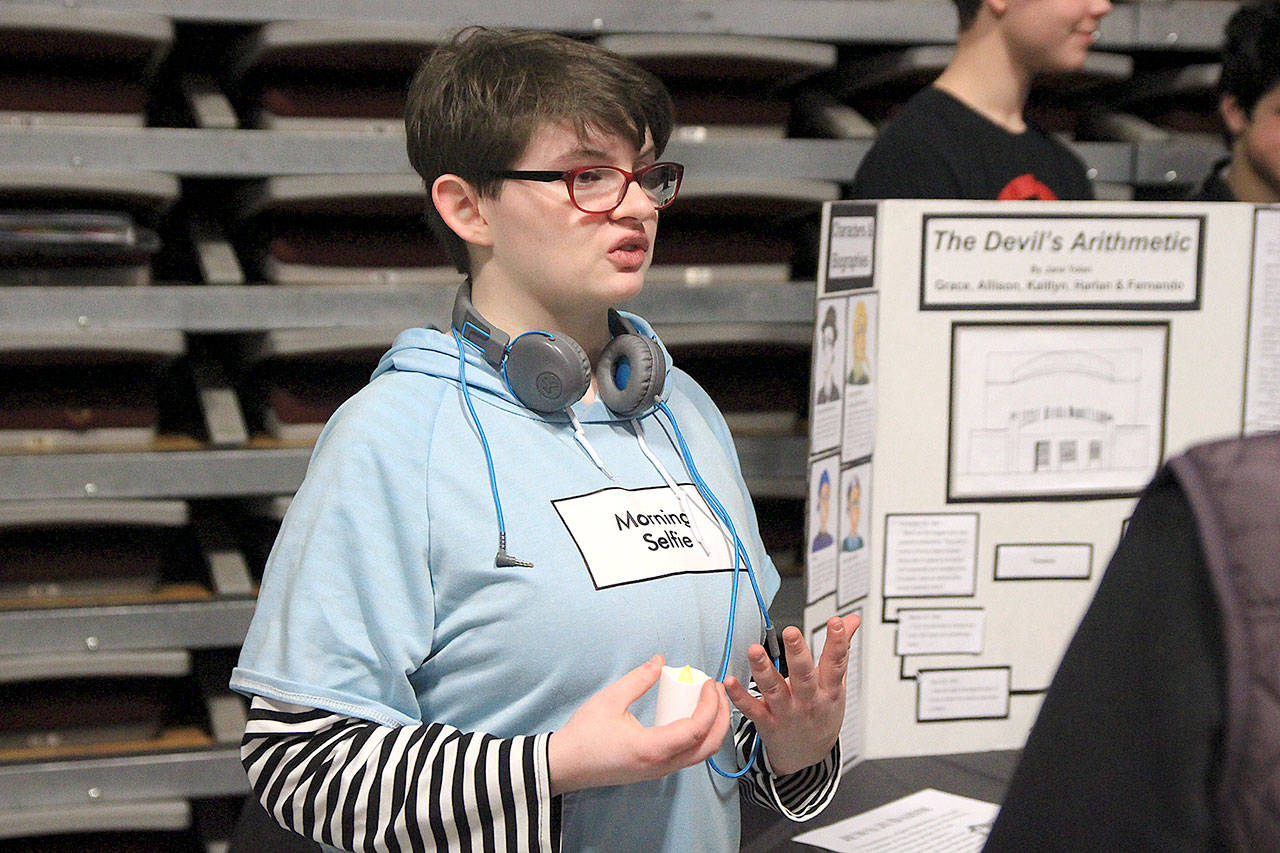Coupeville eighth grader Jones Walther recognizes that it’s easy to remove oneself from a tragedy as immense and seemingly distant as the Holocaust. But she and others in her class at Coupeville Middle School set out to demonstrate that the lessons about the historical event continue to be relevant.
“I didn’t know that other genocides had happened since,” Walther said.
“But it has happened since, and it’s important to learn about it and make sure it doesn’t happen ever again,” she later added.
Monday morning, Walther stood among her peers in the middle school performing arts center in front of a tri-fold display describing the graphic novel “Maus II: A Survivor’s Tale: And Here My Troubles Began,” in which the author depicts stories from his father, who was a Jewish Holocaust survivor.
Coupeville Middle School eighth graders have spent the past few months of English class in different book groups reading historical fiction about the Holocaust and researching the event. On Monday, the groups shared displays that illustrated the lessons they learned and answered questions from passing visitors during the book exhibit.
This showcase of students’ work was supposed to take place on Jan. 27, the anniversary of the liberation of Auschwitz-Birkenau and International Holocaust Remembrance Day, said Casie Dunleavy, English and language arts teacher. But snow days pushed the event back.
The state Legislature agrees with Walther’s analysis about the importance of continuing to learn about the state-sponsored killing and persecution of Jewish people and other minorities. Last session, both chambers unanimously approved a bill to encourage districts to teach about the Holocaust and use best practices created by the Office of the Superintendent of Public Instruction in cooperation with an expert nonprofit organization.
Dunleavy learned about some of these best practices at a Holocaust Center for Humanity workshop in Seattle. The nonprofit focuses on teaching the history of the systematic genocide under Adolf Hitler in order “to fight hate by educating students, teachers and the general public about the dangers of intolerance and the difference each one of us can make,” according to its website.
Dunleavy kept in communication with the center and eventually shared her idea for an exhibit in which students would share lessons learned from the novels they read about the Holocaust.
Staff members from the center liked the idea so much that it will likely become a model for other school districts the nonprofit works with, according to Paul Regelbrugge, professional development and curriculum counselor at the center.
He attended the event and helped introduce the exhibits alongside the eighth-grade speakers. A videographer from the center took footage of the exhibit and students that will be shown at the center’s annual fundraiser as an example of work the nonprofit supports.
The book groups read novels such as “The Book Thief,” “The Boy in the Stripped Pajamas” and “The Devil’s Arithmetic.”
William Davidson and Andrew Williams were among the group who read “Resistance,” a 2018 novel about a Jewish teenager living in Nazi-occupied Poland who joins a resistance movement. The story is fiction, but real events like the Warsaw Uprising create the setting.
Davidson said he learned that it’s “not always the biggest things that make a big difference.” Williams added that the book describes the major impacts small gestures, such as a British broadcast of support for the Polish underground or a piece of smuggled bread, can make.
Middle school is a good time to impart lessons about the positive ripple effects of kindness and negative ones of prejudice and complacency, Regelbrugge said. Middle and high school represent a good age to impress upon the younger generation that harassment and bullying are where larger atrocities can begin, he said.
Early education is how the organization hopes to “check hatred” and make the world a little better place to live, he said.
Dunleavy was proud of how the students took ownership of their learning and became the teachers for this unit, she said.
“The lessons of the holocaust have really hit home,” she said of the eighth graders, “which is really the most meaningful part of why we read.”



